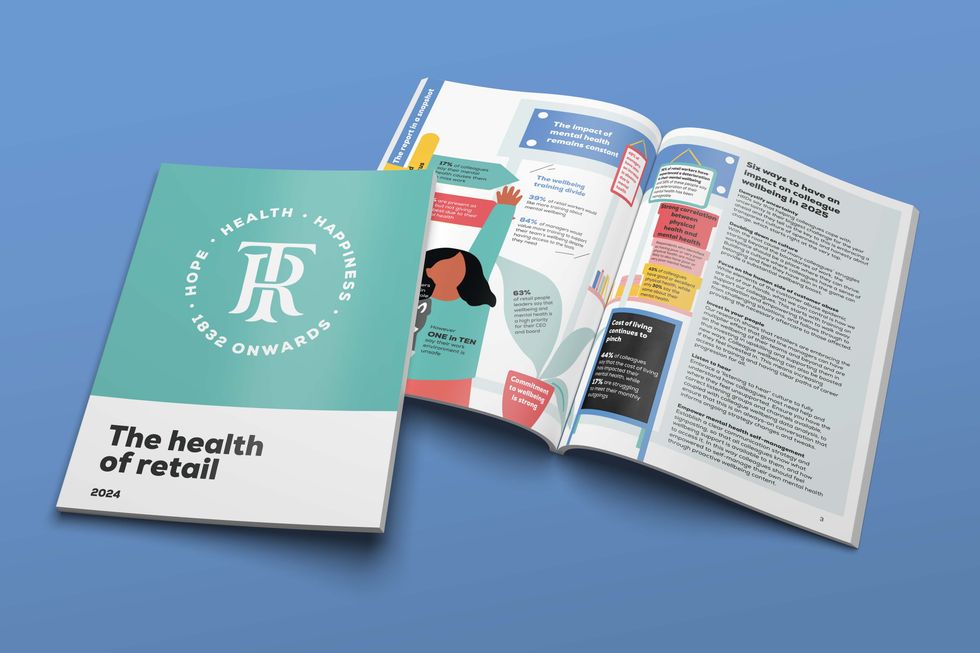Retailers have been urged to improve workplace wellbeing after a new report by retail industry charity the Retail Trust found poor mental health is causing nearly one third (31 per cent) of retail call centre staff and 29 per cent of Gen Z workers to take time off work.
The Retail Trust’s survey of more than 1,300 retail workers, published within its new health of retail report, found one in six (17 per cent) have missed at least a day of work due to poor mental health this year with call centre staff and younger workers twice as likely to have called in sick.
Nearly three quarters (71 per cent) of all retail employees surveyed by the Retail Trust said that mental health issues are also causing them to underperform at work.
More mental health training, improving workplace cultures and providing staff with more self-help tools to manage and measure their wellbeing are some of the recommendations included in the Retail Trust’s health of retail report.
It follows the Retail Trust’s first Retail People Index this summer with global consulting firm AlixPartners which found that half of retail employees are also at risk of quitting their jobs after Christmas due to declining wellbeing over the autumn and winter months.
Chris Brook-Carter, chief executive of the Retail Trust, said, “Retail is the largest employer outside the public sector, so these findings have profound implications for the UK workforce. Many retailers are already taking important steps to address poor mental wellbeing within their organisations but more clearly still needs to be done and especially for those most affected, like younger workers and call centre staff.
“While retail employers may not be responsible for causing their staff’s mental health issues, they are paying the price in absenteeism and underperformance. They must continue to invest in training, create more positive work cultures, and implement preventative measures to mitigate the mental health challenges their workers face.”
Lonely, anxious and struggling to sleep
82 per cent of younger workers also reported deteriorating mental health over the last year while nearly half (46 per cent) of call centre staff said they often feel lonely at work.
Anxiety and sleep-related issues were also found to be on the rise across the retail workforce, with 67 per cent of staff reporting increased anxiety, up from 63 per cent in 2023, and 58 per cent now experiencing poor sleep compared to 53 per cent last year.
There were also year-on-year increases in the number of people feeling overwhelmed (from 49 per cent to 53 per cent) and struggling to think clearly (42 per cent to 46 per cent).
Nearly 44 per cent of retail workers cited the rising cost of living as a significant factor affecting their mental health, while 33 per cent of store workers reported that abuse from customers had negatively impacted their wellbeing.
20 household name retailers were also interviewed for the report and one people leader at a specialist high street chain told the Retail Trust, “I’ve worked in HR a long time and I’ve never seen people this desperate. We’re having to do more and more to help our people.”
Half (49 per cent) of retail managers surveyed by the Retail Trust said they had seen an increase in absences due to mental health issues in the last year and the head of people at an outdoors retailer said, “Long-term health issues and sickness as a result of mental health is definitely something we’ve seen more of in the last year. The thing about absenteeism is that it has a knock-on effect to other colleagues and really hits the bottom line.”
“There is less and less support for people in the public sphere, and it now falls on us, or their line managers."
The HR director of a home and fashion retailer added: “Dealing with absenteeism, and particularly sickness absenteeism, is a priority for us. We want to help people to be at work, so we are focused on what we can do to support that.”
The Retail Trust works with more than 200 retail employers to improve the mental health of their staff and has partnered with Foot Anstey, Nutun, Peoplesafe and Sabio to create its latest health of retail report.
The charity also launched a new generative AI powered dashboard earlier this year to help retailers better track staff wellbeing trends and improve the effectiveness of support.
Six ways to positively impact staff wellbeing from the Retail Trust
Doubling down on culture
With the root cause of many colleagues’ struggles starting beyond the boundaries of work, the workplace should be a place where they can thrive. Building a culture where colleagues have a sense of belonging and feel they have skin in the game can provide a substantial wellbeing boost.
Invest in people
The Retail Trust’s research found that the best retailers are embracing the multiplier effect that good line managers can have on the wellbeing of their teams and beyond, and are investing in upskilling and supporting them in new ways. Colleague wellbeing can also be boosted if they feel invested in. This means increasing access to training and having clear paths of career progression for all.
Listen to hear
Embracing a “listening to hear” culture will help employers fully understand how colleagues most need help and where they feel unsupported. This means ensuring they have the correct listening groups and channels available always-on conversations that inform ongoing strategy changes and tweaks.
Empower mental health self-management
A clear communications strategy and signposting will ensure that all colleagues know what wellbeing support is available to them, and how to access it. In this way, they should feel empowered to self-manage their own mental health.
Demystify uncertainty
Retailers interviewed for the report said that helping colleagues cope with uncertainty is their biggest challenge for the year ahead and the key to this is embracing a transparent culture of openness and honesty about change, which starts right at the very top.
Focus on the human side of customer abuse
While elements of the customer abuse epidemic are out of retailers’ hands, they can control how they support their colleagues. This starts with training on de-escalation and empowering them to walk away from sales, and follows through to providing the necessary after care to those affected.




